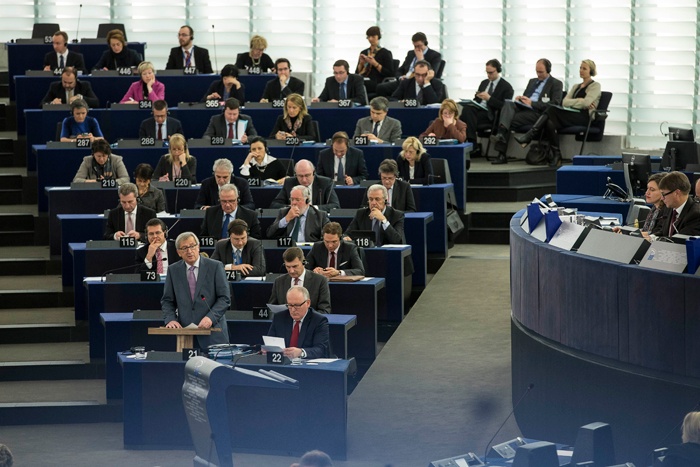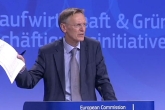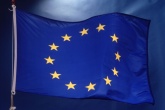EC to develop 'more ambitious' circular economy package
The European Commission (EC) has today (16 December) withdrawn its plans to introduce a circular economy package and new waste targets, in a bid to resubmit ‘more ambitious’ proposals.
At the plenary session of the commission’s 2015 work programme, it was announced that the commission had decided to withdraw the package “to make way for a broader, and more ambitious approach that can be more effective”.
When announcing the decision at the plenary session today, Frans Timmermans, First Vice-President of the EC in charge of Better Regulation, Inter-Institutional Relations, the Rule of Law and the Charter of Fundamental Rights (pictured first row, far right), was greeted with cries of ‘shame’, to which he said: “Let me finish, then you can still cry ‘shame’. But perhaps it is not necessary.”

He stated: “We want to make sure that the circular economy is approached indeed in a circular way, and not just half the circle, which means that we will withdraw the present waste proposal and come back with a more ambitious proposal that will cover the whole of the circular economy.
“We will do this in 2015; we will not drag our feet with this. We will do this very quickly because we want the circular economy to be in pole position when the Juncker plan is being put into effect so that the economy that can profit from investment is indeed smack in the middle of the circular economy… So if we withdraw the waste packages it’s because we want to put something on the table that is more ambitious and that really has a huge contribution on part of the European economy that really needs a boost, which is the circular economy. We can do this… I’m deeply convinced of this.”
Timmermans paused to address the audience: “No shame?” he asked. “Good”. He went on to outline that the new ‘more ambitious proposal’ will be released next year and that the EC will be promoting investment in the sector through the new European fund for strategic investment as well as through the European structural and investment funds.
Parts of air quality package to go ahead
The EC has also agreed today to push ahead with certain elements of the Clean Air Directive, which aims to reduce the effect of air pollution on human health and the environment.
Timmermans said that there were ‘good prospects’ that the medium-sized combustion plants proposal will be adopted ‘soon’. However, he noted that there was a gap between what European Parliament and the European Council viewed as an acceptable proposal on national emissions ceilings and that it will negotiate on modified proposals in future. He said: “We are not comprising on the goals we want to obtain, we are looking critically at the methods we can use to bring parties together so that we can have a conclusion that actually can be implemented soon, so that we can reach cleaner air in the EU.”
Speaking on behalf of the UK government, Resource Minister Dan Rogerson commented: “Improving air quality and making better use of waste are priorities for the UK – we’re committed to achieving both and it’s essential that we inject the right level of ambition when agreeing targets. As the European Commission review their approach we have been in close contact with them, setting out our position.
“We support the National Emission Ceilings Directive – it is important for improving air quality across Europe. We also fully support 2020 targets but believe amendments are needed so 2030 ceilings are realistic, evidence-based and deliverable. We also support efforts to reduce waste and make better use of our resources.”
Circular economy package background
Released in July by the previous administration of the EC (which was replaced on 1 November), the draft circular economy package featured a proposed 70 per cent recycling and reuse target for 2030, as well as a requirement to increase the recycling rate for packaging waste to 80 per cent by 2030 (with interim targets of 60 per cent by 2020 and 70 per cent by 2025) and a ban on the landfilling of recyclable plastics, metals, glass, paper and cardboard, and biodegradable waste by 2025.
The previous administration claimed that adopting the new targets would create 580,000 new jobs, while making ‘Europe more competitive and reducing demand for costly scarce resources’.
The package was largely welcomed by the waste and resources industry, and an impact assessment into the proposals showed that 84 per cent of stakeholders thought the EC should ‘increase or expand existing recycling targets’ and 55 per cent agreed that new waste prevention targets should be implemented.
Despite this data however, leaked versions of the working programme suggested that EC was to withdraw the circular economy package from its working programme for 2015, because it believed there would be ‘no foreseeable agreement’ with EU states that have poor recycling records. This was met with widespread criticism from industry, politicians and environmental groups, and saw many lobby the EC to change its mind, which may have helped lead the EC to its decision today.
A full resolution on the working programme will be drawn up and put to the vote during the European Parliament's January session.
Find out more about the EC’s draft circular economy package.









